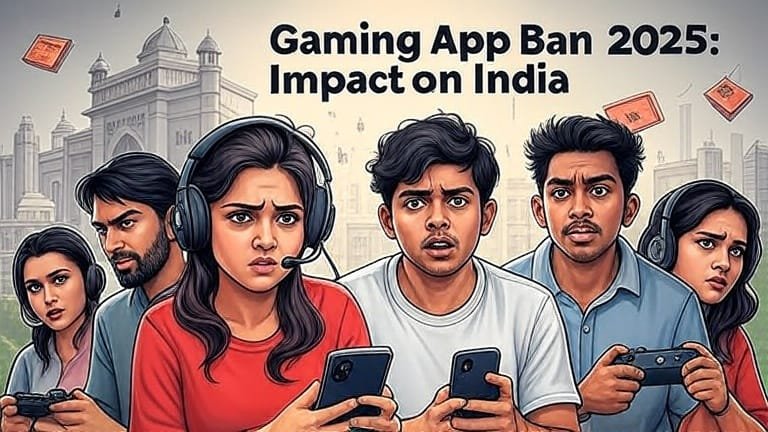New Delhi, August 31, 2025, 08:57 PM IST – India’s recent legislative move to ban real-money gaming apps has sent shockwaves through the country’s burgeoning digital economy. The Promotion and Regulation of Online Gaming Bill, 2025, passed by both houses of Parliament and awaiting presidential assent, prohibits all online games involving monetary transactions, including popular platforms like Dream11, MPL, and Zupee. This sweeping ban, aimed at curbing addiction and financial distress, is set to reshape the Indian market, influence the global operations of these apps, and result in significant economic losses. Here’s a closer look at the multifaceted impact.
Disruption in the Indian Market
The Indian gaming industry, valued at approximately $3.7 billion in 2024, has been a fast-growing sector, driven by high mobile penetration and affordable data. The real-money gaming (RMG) segment, which includes fantasy sports, rummy, and poker, accounted for 85.7% of the industry’s revenue last year, according to industry estimates. However, the ban threatens to dismantle this ecosystem, affecting over 400 companies and 2 lakh direct and indirect jobs. Major players like Dream11, Games24x7, and Mobile Premier League have already begun suspending cash-based operations, leaving thousands of employees and skilled professionals jobless almost overnight.
The government justifies the ban by highlighting severe social and economic harms, including an estimated ₹20,000 crore annual loss to 45 crore users, as stated by Union IT Minister Ashwini Vaishnaw. Cases of financial ruin, addiction, and even suicides linked to these platforms have prompted this drastic step. Yet, the lack of a transition plan or differentiation between skill-based and chance-based games has drawn criticism from industry leaders, who argue that the blanket prohibition could stifle innovation and push users toward unregulated offshore platforms, exacerbating the very issues the ban seeks to address.
Beyond employment, the ban is expected to hit ancillary sectors like advertising and content creation, which relied heavily on gaming app revenue. Businesses that invested billions in this sector, including startups like Rush, are now shifting operations abroad, signaling a potential loss of capital and talent from India.
Operations in Other Countries
While the ban restricts real-money gaming within India, its impact on the global operations of these companies remains nuanced. Indian gaming apps with international footprints, such as Dream11 and MPL, are likely to continue their cash-based services in countries where such activities are legally permitted. The United States, for instance, adopts a state-by-state regulatory approach, with states like New Jersey and Pennsylvania allowing licensed online gambling. The United Kingdom also regulates the sector with strict advertising and licensing norms, offering a viable market for these platforms.
Companies are already exploring relocation strategies. Entrepreneur Kavin Mittal’s platform, Rush, has announced a complete exit from India to focus on the U.S. and global markets, a move that underscores the industry’s adaptability. However, sustaining operations abroad will require significant investment in compliance with local laws, rebranding, and rebuilding user bases, which could strain finances already impacted by the Indian ban. For smaller firms without international presence, the ban might force closures, limiting their global reach.
Financial Loss Estimates
The financial toll of the ban on the Indian economy is substantial. Industry associations estimate a revenue loss of ₹15,000–20,000 crore annually, including GST collections that the government has deemed a necessary sacrifice for public interest. The sector’s contribution to direct and indirect taxes, pegged at over ₹20,000 crore yearly, will also evaporate, affecting state and central revenues. Additionally, the write-off of ₹25,000 crore in foreign direct investment (FDI) and a potential loss of ₹10,000 crore in economic activity further compound the impact.
For individual companies, the stock market has already reflected the uncertainty. Shares of Nazara Technologies, with a stake in PokerBaazi, plummeted by 17% in recent sessions, while Delta Corp, a casino and gaming firm, saw a 3.14% dip. The total market value erosion could exceed ₹30,000 crore if the sector fails to pivot to non-monetary gaming models like esports, which the bill promotes.
Experts warn that the shift to offshore platforms could lead to an untracked financial loss, with the illegal gaming market potentially growing to over $100 billion globally, as seen in China’s experience with similar bans. This could result in lost tax revenue and increased risks of fraud and money laundering, challenging the ban’s long-term effectiveness.
The Road Ahead
The ban’s success hinges on robust enforcement, including blocking payment channels and advertisements, but historical efforts to curb illegal betting apps suggest this will be an uphill battle. Companies are contemplating legal challenges, citing constitutional rights to trade, while the government prepares to establish a regulatory authority to oversee esports and social gaming.
For now, the Indian market faces a period of adjustment, with economic losses likely to persist until alternative revenue streams emerge. Globally, Indian gaming apps may find new footholds, but their growth will depend on navigating diverse regulatory landscapes. As the ban takes effect, the balance between public welfare and economic opportunity remains a critical question for policymakers and industry stakeholders alike.



Average Rating